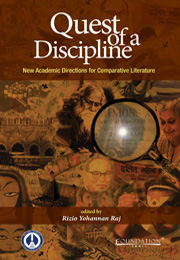Book contents
- Frontmatter
- Contents
- List of Contributors
- Acknowledgements
- Prologue to the “Quest'
- Introduction
- PART I Traditions and Manifestoes: Reflecting on Perspectives
- PART II The Quest Motif: Redefining the Scope of Comparative Literature
- PART III The Dynamics of Exchange: Genres, Areas and Disciplines
- PART IV India: A Curious Comparative Space
- Afterword: Comparative? Literature?
- Index
PART III - The Dynamics of Exchange: Genres, Areas and Disciplines
Published online by Cambridge University Press: 05 June 2012
- Frontmatter
- Contents
- List of Contributors
- Acknowledgements
- Prologue to the “Quest'
- Introduction
- PART I Traditions and Manifestoes: Reflecting on Perspectives
- PART II The Quest Motif: Redefining the Scope of Comparative Literature
- PART III The Dynamics of Exchange: Genres, Areas and Disciplines
- PART IV India: A Curious Comparative Space
- Afterword: Comparative? Literature?
- Index
Summary
Comparative Literature has always concerned itself with special studies on genres and areas, and it has engaged itself in interdisciplinary pursuits in order to understand literature in its different forms and roles. These attempts have expanded its textual universe and have recovered for literary scholars many integral connections among various disciplines, interrelatedness of generic codes, and comparable socio-cultural and political conditions impacting literature in different areas. This section studies the curious interrelationships between literary and performative spaces, the sites of the text and image, the ethos of a text in one language and that of its alter text in another language. It is particularly significant that this section features voices that come from the world of practice beyond the usual round of academics, such as V. Kaladharan's and E. P. Unny's. While Kaladharan analyses the text/performance symbiosis, E. P. Unny, a practising cartoonist, investigates how in our day ‘the new image-embedded text (text-image) is impacting diverse societies outside its parent zone.’ Zeng Qiong analyses the twentieth century literary exchanges between China and India, while Abdullah Hassan Al-Saqqaf offers a rare Arab perspective of India as a diasporic site. Chandra Mohan illustrates how literary studies are integrally linked to the Humanities and Social Sciences and suggests that insightful and socially relevant studies exploring this connection may be taken up under the aegis of Comparative Literature in order to redefine the discipline, and for it to negotiate institutional spaces.
- Type
- Chapter
- Information
- Quest of a DisciplineNew Academic Directions for Comparative Literature, pp. 155 - 156Publisher: Foundation BooksPrint publication year: 2012



